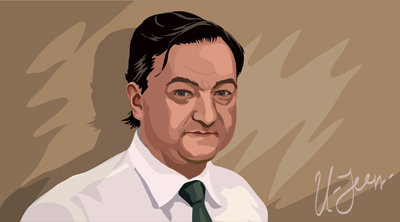MOSCOW, March 4 - RAPSI. Moscow’s Tverskoy District Court will conduct an examination of the merits of criminal proceedings launched against deceased whistleblower Sergei Magnitsky, who died in a Moscow pretrial detention center in 2009 while awaiting trial on charges of tax evasion, RAPSI learned in court Monday.
The court spokesman told RAPSI that the hearing on the merits will be held at 11am on March 11.
The deceased Magnitsky, formerly an auditor with Hermitage Capital Management, is being accused alongside Hermitage CEO William Browder of tax evasion.
The court held preliminary hearings Monday in a closed-door session.
Attorneys have been pointed for both Magnitsky and Browder, as neither are present in the courtroom. The hearing has so far been conducted in absentia, for obvious reasons in Magnitsky’s case, and in Broweder’s case – based on the refusal of UK authorities to extradite.
Attorney Alexander Molokhov attempted to gain access to the courtroom in order to represent the whistle blower’s interests. He claims to have been hired some time ago by friends of Magnitsky, but was denied entry to the courtroom.
The controversial decision to prosecute a deceased defendant
The decision by Russian prosecutors to continue to prosecute Magnitsky even in the afterlife has provoked a firestorm of criticism.
Under Russian criminal law, a dead person can be prosecuted. According to Article 24 of the Russian Code of Criminal Procedure, proceedings can be closed against a deceased person who stood accused of some some crime pending the consent of his relatives. The case would then be closed on so called non-rehabilitative grounds meaning that relatives of the person do not demand the deceased person to be recognized as innocent. Under the law, if a family wants their deceased to be cleared of all charges and declared innocent, they must approve ongoing investigations.
In a statement issued last January, Amnesty International Europe and Central Asia Director John Dalhuisen, "The Russian authorities' intention to proceed with the criminal prosecution of Sergei Magnitsky violates his fundamental rights even in death, in particular the right to defend himself in person. The trial of a deceased person and the forcible involvement of his relatives is a dangerous precedent that would open a whole new chapter in Russia's worsening human rights record.”
Background of the case
Magnitsky was arrested on November 24, 2008 on suspicion of masterminding large-scale corporate tax evasion. He died in a Moscow pretrial detention center on November 16, 2009, after spending a year behind bars awaiting trial.
According to the Prosecutor General's Office, Magnitsky died of heart failure.
Magnitsky's death evoked an international public outcry, triggered amendments to the Criminal Code and a reshuffling of officials in the penal system.
Dmitry Kratov, former deputy head of the Butyrka pretrial detention center, and the ward's doctor, Larisa Litvinova, were defendants in the case of Magnitsky's death. In December 2012, the court has acquitted Kratov of negligence which resulted in Sergei Magnitsky's death. The case against Litvinova was closed in spring 2012 following amendments to the Criminal Code affecting the statute of limitations.
According to investigators, Magnitsky and his accomplices embezzled hundreds of millions of rubles from the budget by manipulating tax returns between September and October 2007.
For its part, Hermitage Capital maintains that it paid 5.4 billion rubles (around $180 million) in taxes, but that the money was stolen by corporate raiders with the help of law enforcement officials.
Magnitsky's prosecution has been attributed to this theft. The case was closed after his death, only to be reopened later. Under Russian criminal law, it is possible to prosecute a person after their death.
In May 2012, the Moscow City Court rejected an application filed by Magnitsky's relatives who demanded to have the criminal case against him closed.



